Strategic Human Resources Management at Four Seasons Hotels: Report
VerifiedAdded on 2023/01/09
|12
|3814
|97
Report
AI Summary
This report provides a comprehensive analysis of the strategic human resource management (HRM) practices at Four Seasons Hotels. It begins by examining key current developments and trends influencing Four Seasons' HR strategy, such as technological advancements in AI and performance management systems, and internal and external factors like internal demand and financial resources. The report then explores relevant concepts and theories, including Contingency Theory and Universalist Theory, to understand the growth and development of strategic HRM at Four Seasons. It further analyzes how change management models, specifically Kotter's 8-Step Model, support HR operations within the organization. The report also addresses the measurement and monitoring of HR outcomes and how HR development supports organizational objectives and sustainable performance. The report concludes by highlighting the significance of strategic HRM in the hospitality industry and its impact on Four Seasons Hotels' success.
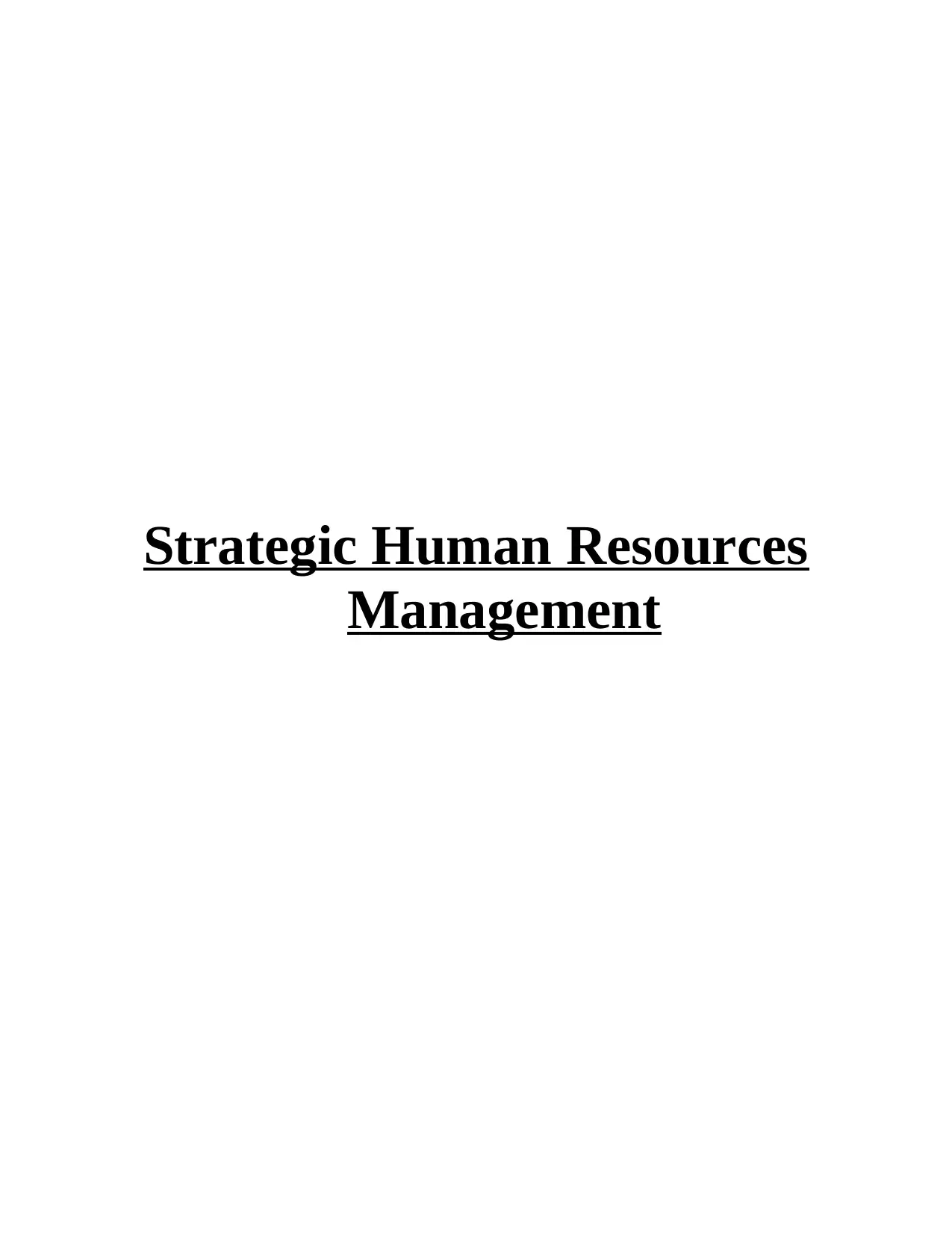
Strategic Human Resources
Management
Management
Paraphrase This Document
Need a fresh take? Get an instant paraphrase of this document with our AI Paraphraser
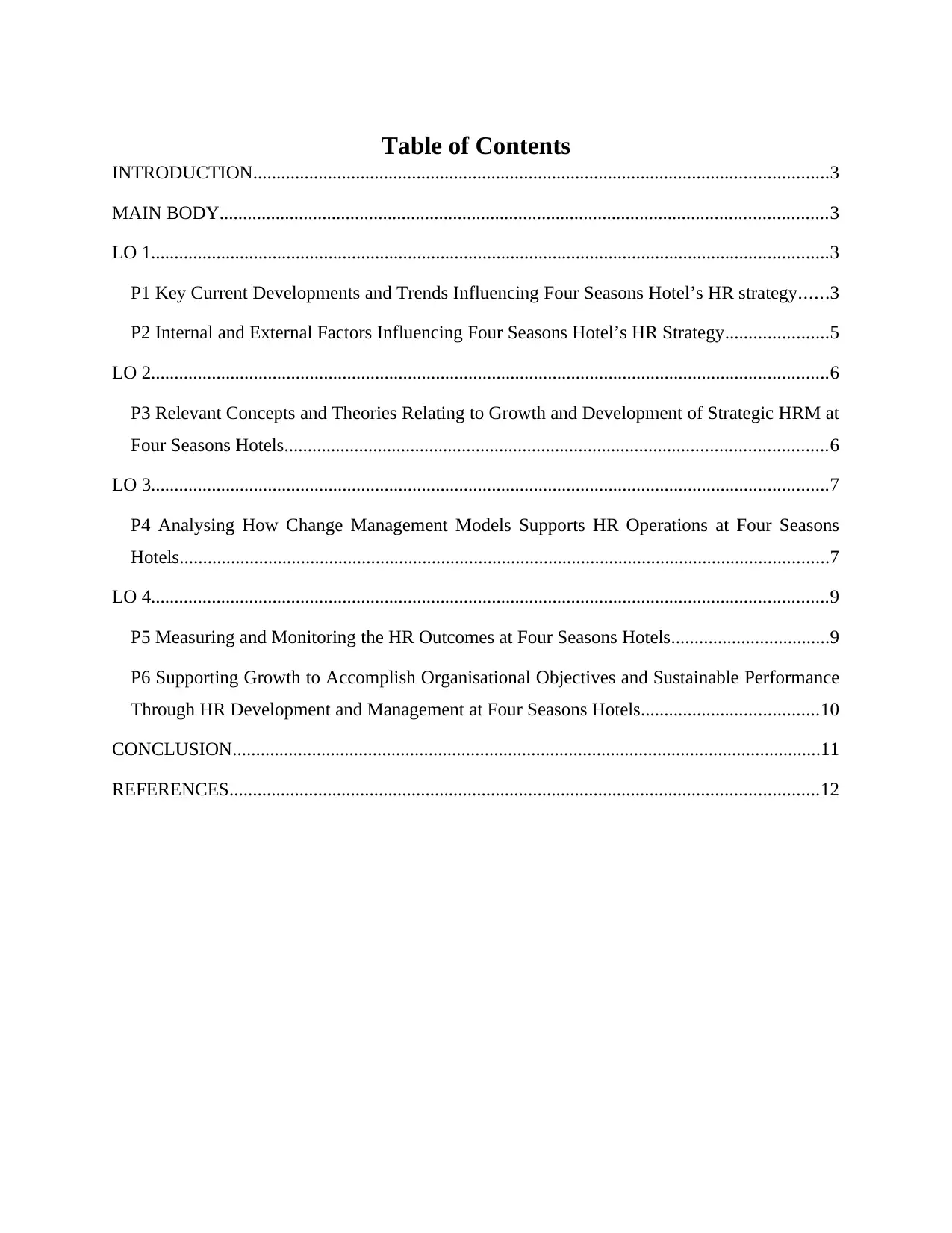
Table of Contents
INTRODUCTION...........................................................................................................................3
MAIN BODY..................................................................................................................................3
LO 1.................................................................................................................................................3
P1 Key Current Developments and Trends Influencing Four Seasons Hotel’s HR strategy......3
P2 Internal and External Factors Influencing Four Seasons Hotel’s HR Strategy......................5
LO 2.................................................................................................................................................6
P3 Relevant Concepts and Theories Relating to Growth and Development of Strategic HRM at
Four Seasons Hotels....................................................................................................................6
LO 3.................................................................................................................................................7
P4 Analysing How Change Management Models Supports HR Operations at Four Seasons
Hotels...........................................................................................................................................7
LO 4.................................................................................................................................................9
P5 Measuring and Monitoring the HR Outcomes at Four Seasons Hotels..................................9
P6 Supporting Growth to Accomplish Organisational Objectives and Sustainable Performance
Through HR Development and Management at Four Seasons Hotels......................................10
CONCLUSION..............................................................................................................................11
REFERENCES..............................................................................................................................12
INTRODUCTION...........................................................................................................................3
MAIN BODY..................................................................................................................................3
LO 1.................................................................................................................................................3
P1 Key Current Developments and Trends Influencing Four Seasons Hotel’s HR strategy......3
P2 Internal and External Factors Influencing Four Seasons Hotel’s HR Strategy......................5
LO 2.................................................................................................................................................6
P3 Relevant Concepts and Theories Relating to Growth and Development of Strategic HRM at
Four Seasons Hotels....................................................................................................................6
LO 3.................................................................................................................................................7
P4 Analysing How Change Management Models Supports HR Operations at Four Seasons
Hotels...........................................................................................................................................7
LO 4.................................................................................................................................................9
P5 Measuring and Monitoring the HR Outcomes at Four Seasons Hotels..................................9
P6 Supporting Growth to Accomplish Organisational Objectives and Sustainable Performance
Through HR Development and Management at Four Seasons Hotels......................................10
CONCLUSION..............................................................................................................................11
REFERENCES..............................................................................................................................12
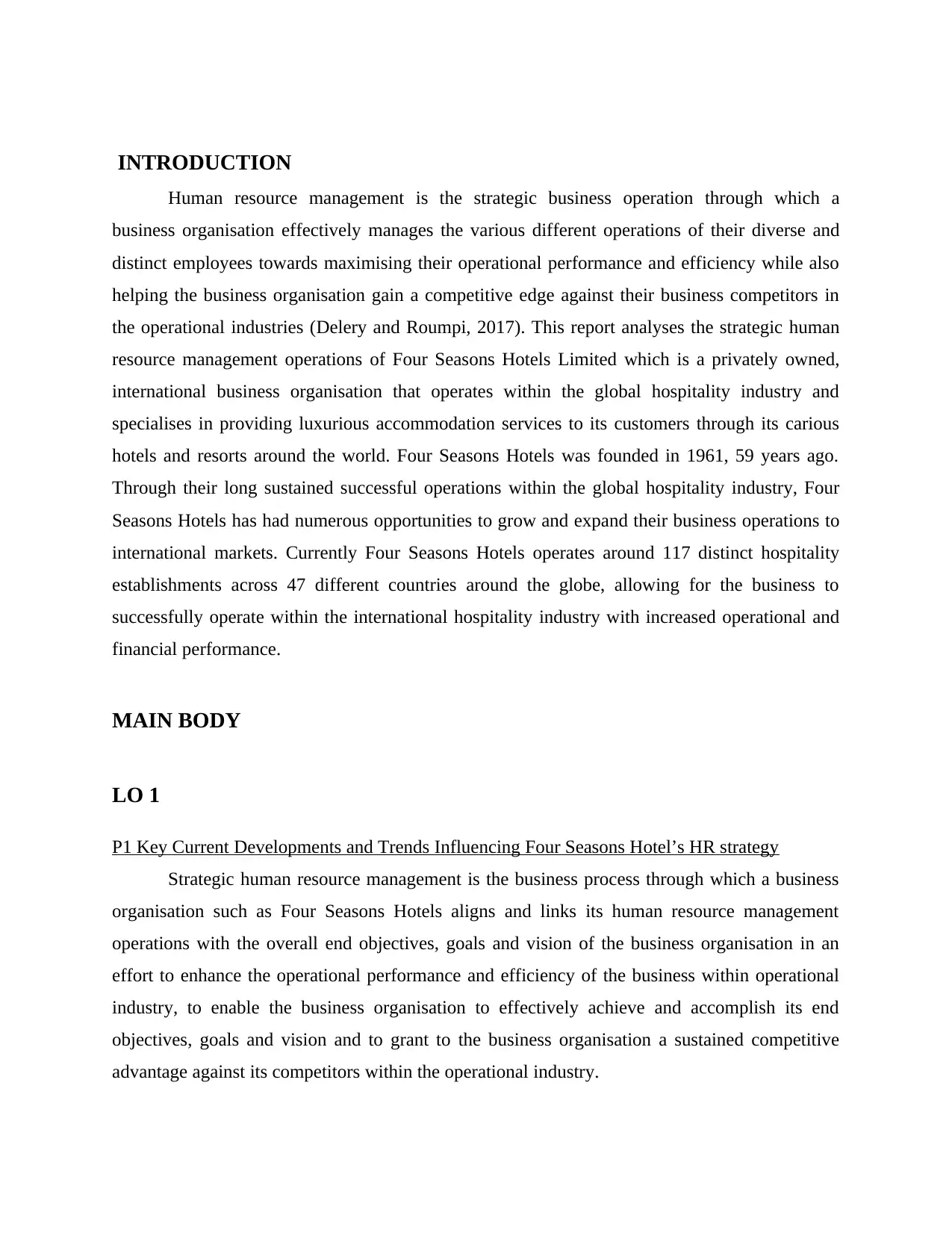
INTRODUCTION
Human resource management is the strategic business operation through which a
business organisation effectively manages the various different operations of their diverse and
distinct employees towards maximising their operational performance and efficiency while also
helping the business organisation gain a competitive edge against their business competitors in
the operational industries (Delery and Roumpi, 2017). This report analyses the strategic human
resource management operations of Four Seasons Hotels Limited which is a privately owned,
international business organisation that operates within the global hospitality industry and
specialises in providing luxurious accommodation services to its customers through its carious
hotels and resorts around the world. Four Seasons Hotels was founded in 1961, 59 years ago.
Through their long sustained successful operations within the global hospitality industry, Four
Seasons Hotels has had numerous opportunities to grow and expand their business operations to
international markets. Currently Four Seasons Hotels operates around 117 distinct hospitality
establishments across 47 different countries around the globe, allowing for the business to
successfully operate within the international hospitality industry with increased operational and
financial performance.
MAIN BODY
LO 1
P1 Key Current Developments and Trends Influencing Four Seasons Hotel’s HR strategy
Strategic human resource management is the business process through which a business
organisation such as Four Seasons Hotels aligns and links its human resource management
operations with the overall end objectives, goals and vision of the business organisation in an
effort to enhance the operational performance and efficiency of the business within operational
industry, to enable the business organisation to effectively achieve and accomplish its end
objectives, goals and vision and to grant to the business organisation a sustained competitive
advantage against its competitors within the operational industry.
Human resource management is the strategic business operation through which a
business organisation effectively manages the various different operations of their diverse and
distinct employees towards maximising their operational performance and efficiency while also
helping the business organisation gain a competitive edge against their business competitors in
the operational industries (Delery and Roumpi, 2017). This report analyses the strategic human
resource management operations of Four Seasons Hotels Limited which is a privately owned,
international business organisation that operates within the global hospitality industry and
specialises in providing luxurious accommodation services to its customers through its carious
hotels and resorts around the world. Four Seasons Hotels was founded in 1961, 59 years ago.
Through their long sustained successful operations within the global hospitality industry, Four
Seasons Hotels has had numerous opportunities to grow and expand their business operations to
international markets. Currently Four Seasons Hotels operates around 117 distinct hospitality
establishments across 47 different countries around the globe, allowing for the business to
successfully operate within the international hospitality industry with increased operational and
financial performance.
MAIN BODY
LO 1
P1 Key Current Developments and Trends Influencing Four Seasons Hotel’s HR strategy
Strategic human resource management is the business process through which a business
organisation such as Four Seasons Hotels aligns and links its human resource management
operations with the overall end objectives, goals and vision of the business organisation in an
effort to enhance the operational performance and efficiency of the business within operational
industry, to enable the business organisation to effectively achieve and accomplish its end
objectives, goals and vision and to grant to the business organisation a sustained competitive
advantage against its competitors within the operational industry.
⊘ This is a preview!⊘
Do you want full access?
Subscribe today to unlock all pages.

Trusted by 1+ million students worldwide
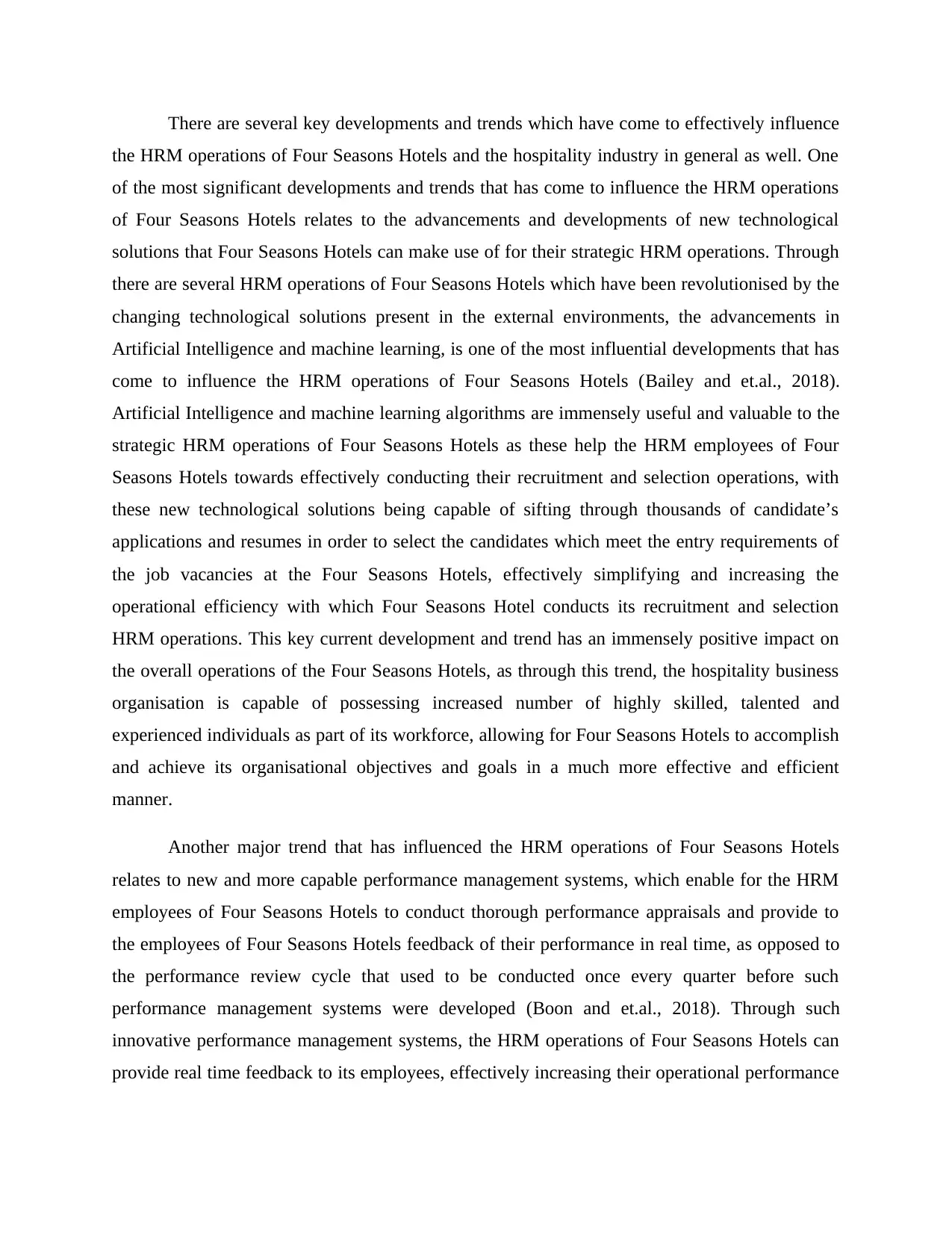
There are several key developments and trends which have come to effectively influence
the HRM operations of Four Seasons Hotels and the hospitality industry in general as well. One
of the most significant developments and trends that has come to influence the HRM operations
of Four Seasons Hotels relates to the advancements and developments of new technological
solutions that Four Seasons Hotels can make use of for their strategic HRM operations. Through
there are several HRM operations of Four Seasons Hotels which have been revolutionised by the
changing technological solutions present in the external environments, the advancements in
Artificial Intelligence and machine learning, is one of the most influential developments that has
come to influence the HRM operations of Four Seasons Hotels (Bailey and et.al., 2018).
Artificial Intelligence and machine learning algorithms are immensely useful and valuable to the
strategic HRM operations of Four Seasons Hotels as these help the HRM employees of Four
Seasons Hotels towards effectively conducting their recruitment and selection operations, with
these new technological solutions being capable of sifting through thousands of candidate’s
applications and resumes in order to select the candidates which meet the entry requirements of
the job vacancies at the Four Seasons Hotels, effectively simplifying and increasing the
operational efficiency with which Four Seasons Hotel conducts its recruitment and selection
HRM operations. This key current development and trend has an immensely positive impact on
the overall operations of the Four Seasons Hotels, as through this trend, the hospitality business
organisation is capable of possessing increased number of highly skilled, talented and
experienced individuals as part of its workforce, allowing for Four Seasons Hotels to accomplish
and achieve its organisational objectives and goals in a much more effective and efficient
manner.
Another major trend that has influenced the HRM operations of Four Seasons Hotels
relates to new and more capable performance management systems, which enable for the HRM
employees of Four Seasons Hotels to conduct thorough performance appraisals and provide to
the employees of Four Seasons Hotels feedback of their performance in real time, as opposed to
the performance review cycle that used to be conducted once every quarter before such
performance management systems were developed (Boon and et.al., 2018). Through such
innovative performance management systems, the HRM operations of Four Seasons Hotels can
provide real time feedback to its employees, effectively increasing their operational performance
the HRM operations of Four Seasons Hotels and the hospitality industry in general as well. One
of the most significant developments and trends that has come to influence the HRM operations
of Four Seasons Hotels relates to the advancements and developments of new technological
solutions that Four Seasons Hotels can make use of for their strategic HRM operations. Through
there are several HRM operations of Four Seasons Hotels which have been revolutionised by the
changing technological solutions present in the external environments, the advancements in
Artificial Intelligence and machine learning, is one of the most influential developments that has
come to influence the HRM operations of Four Seasons Hotels (Bailey and et.al., 2018).
Artificial Intelligence and machine learning algorithms are immensely useful and valuable to the
strategic HRM operations of Four Seasons Hotels as these help the HRM employees of Four
Seasons Hotels towards effectively conducting their recruitment and selection operations, with
these new technological solutions being capable of sifting through thousands of candidate’s
applications and resumes in order to select the candidates which meet the entry requirements of
the job vacancies at the Four Seasons Hotels, effectively simplifying and increasing the
operational efficiency with which Four Seasons Hotel conducts its recruitment and selection
HRM operations. This key current development and trend has an immensely positive impact on
the overall operations of the Four Seasons Hotels, as through this trend, the hospitality business
organisation is capable of possessing increased number of highly skilled, talented and
experienced individuals as part of its workforce, allowing for Four Seasons Hotels to accomplish
and achieve its organisational objectives and goals in a much more effective and efficient
manner.
Another major trend that has influenced the HRM operations of Four Seasons Hotels
relates to new and more capable performance management systems, which enable for the HRM
employees of Four Seasons Hotels to conduct thorough performance appraisals and provide to
the employees of Four Seasons Hotels feedback of their performance in real time, as opposed to
the performance review cycle that used to be conducted once every quarter before such
performance management systems were developed (Boon and et.al., 2018). Through such
innovative performance management systems, the HRM operations of Four Seasons Hotels can
provide real time feedback to its employees, effectively increasing their operational performance
Paraphrase This Document
Need a fresh take? Get an instant paraphrase of this document with our AI Paraphraser
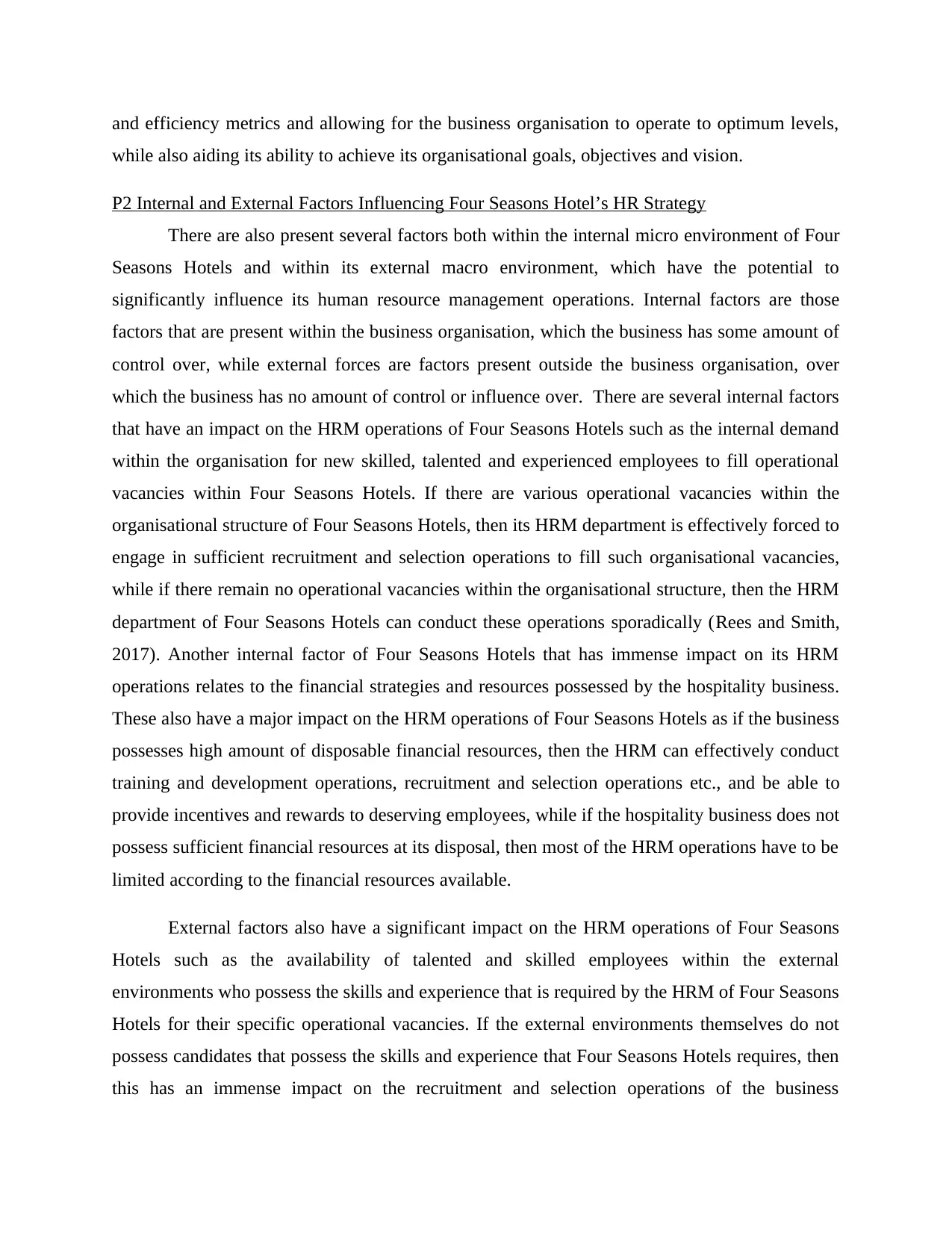
and efficiency metrics and allowing for the business organisation to operate to optimum levels,
while also aiding its ability to achieve its organisational goals, objectives and vision.
P2 Internal and External Factors Influencing Four Seasons Hotel’s HR Strategy
There are also present several factors both within the internal micro environment of Four
Seasons Hotels and within its external macro environment, which have the potential to
significantly influence its human resource management operations. Internal factors are those
factors that are present within the business organisation, which the business has some amount of
control over, while external forces are factors present outside the business organisation, over
which the business has no amount of control or influence over. There are several internal factors
that have an impact on the HRM operations of Four Seasons Hotels such as the internal demand
within the organisation for new skilled, talented and experienced employees to fill operational
vacancies within Four Seasons Hotels. If there are various operational vacancies within the
organisational structure of Four Seasons Hotels, then its HRM department is effectively forced to
engage in sufficient recruitment and selection operations to fill such organisational vacancies,
while if there remain no operational vacancies within the organisational structure, then the HRM
department of Four Seasons Hotels can conduct these operations sporadically (Rees and Smith,
2017). Another internal factor of Four Seasons Hotels that has immense impact on its HRM
operations relates to the financial strategies and resources possessed by the hospitality business.
These also have a major impact on the HRM operations of Four Seasons Hotels as if the business
possesses high amount of disposable financial resources, then the HRM can effectively conduct
training and development operations, recruitment and selection operations etc., and be able to
provide incentives and rewards to deserving employees, while if the hospitality business does not
possess sufficient financial resources at its disposal, then most of the HRM operations have to be
limited according to the financial resources available.
External factors also have a significant impact on the HRM operations of Four Seasons
Hotels such as the availability of talented and skilled employees within the external
environments who possess the skills and experience that is required by the HRM of Four Seasons
Hotels for their specific operational vacancies. If the external environments themselves do not
possess candidates that possess the skills and experience that Four Seasons Hotels requires, then
this has an immense impact on the recruitment and selection operations of the business
while also aiding its ability to achieve its organisational goals, objectives and vision.
P2 Internal and External Factors Influencing Four Seasons Hotel’s HR Strategy
There are also present several factors both within the internal micro environment of Four
Seasons Hotels and within its external macro environment, which have the potential to
significantly influence its human resource management operations. Internal factors are those
factors that are present within the business organisation, which the business has some amount of
control over, while external forces are factors present outside the business organisation, over
which the business has no amount of control or influence over. There are several internal factors
that have an impact on the HRM operations of Four Seasons Hotels such as the internal demand
within the organisation for new skilled, talented and experienced employees to fill operational
vacancies within Four Seasons Hotels. If there are various operational vacancies within the
organisational structure of Four Seasons Hotels, then its HRM department is effectively forced to
engage in sufficient recruitment and selection operations to fill such organisational vacancies,
while if there remain no operational vacancies within the organisational structure, then the HRM
department of Four Seasons Hotels can conduct these operations sporadically (Rees and Smith,
2017). Another internal factor of Four Seasons Hotels that has immense impact on its HRM
operations relates to the financial strategies and resources possessed by the hospitality business.
These also have a major impact on the HRM operations of Four Seasons Hotels as if the business
possesses high amount of disposable financial resources, then the HRM can effectively conduct
training and development operations, recruitment and selection operations etc., and be able to
provide incentives and rewards to deserving employees, while if the hospitality business does not
possess sufficient financial resources at its disposal, then most of the HRM operations have to be
limited according to the financial resources available.
External factors also have a significant impact on the HRM operations of Four Seasons
Hotels such as the availability of talented and skilled employees within the external
environments who possess the skills and experience that is required by the HRM of Four Seasons
Hotels for their specific operational vacancies. If the external environments themselves do not
possess candidates that possess the skills and experience that Four Seasons Hotels requires, then
this has an immense impact on the recruitment and selection operations of the business
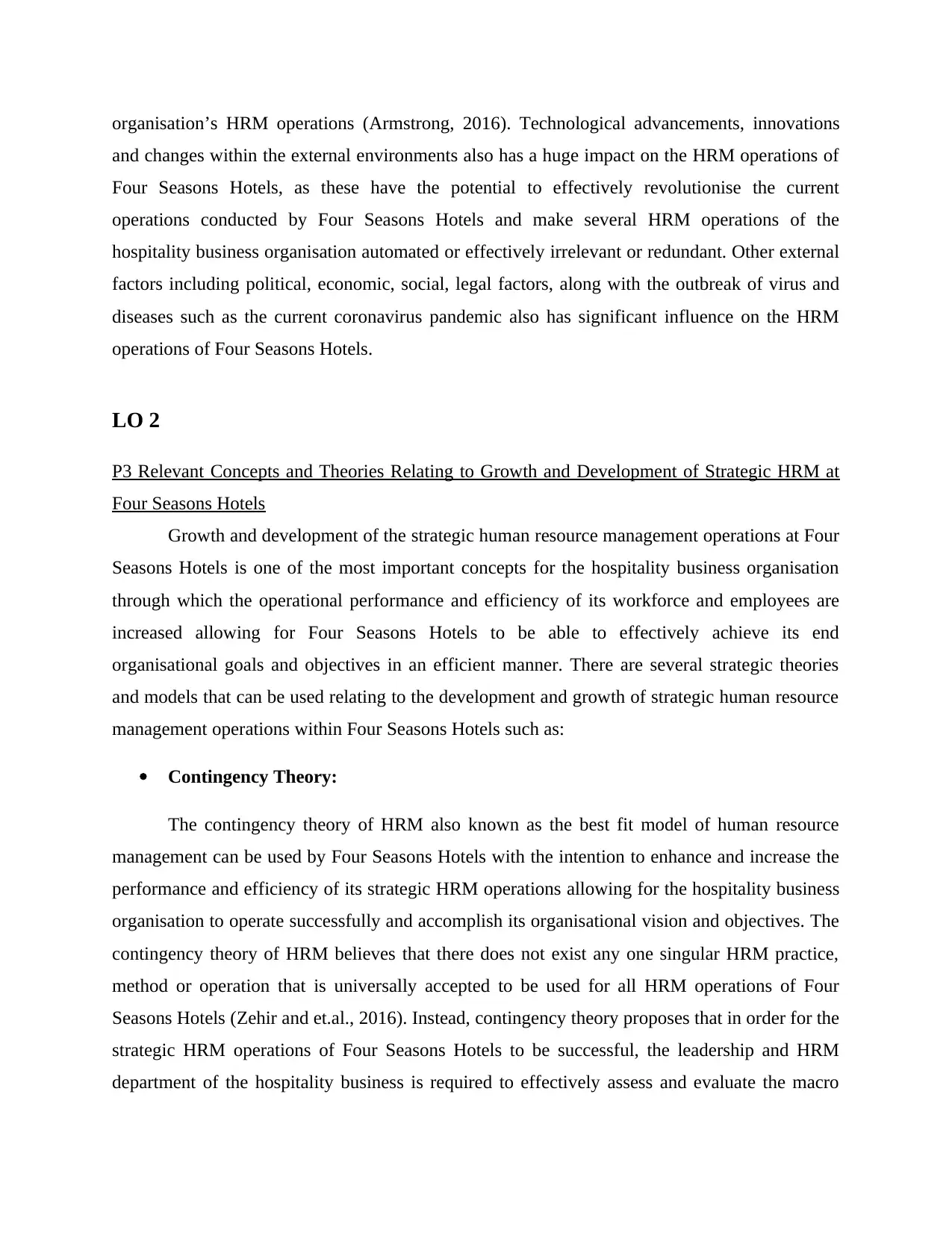
organisation’s HRM operations (Armstrong, 2016). Technological advancements, innovations
and changes within the external environments also has a huge impact on the HRM operations of
Four Seasons Hotels, as these have the potential to effectively revolutionise the current
operations conducted by Four Seasons Hotels and make several HRM operations of the
hospitality business organisation automated or effectively irrelevant or redundant. Other external
factors including political, economic, social, legal factors, along with the outbreak of virus and
diseases such as the current coronavirus pandemic also has significant influence on the HRM
operations of Four Seasons Hotels.
LO 2
P3 Relevant Concepts and Theories Relating to Growth and Development of Strategic HRM at
Four Seasons Hotels
Growth and development of the strategic human resource management operations at Four
Seasons Hotels is one of the most important concepts for the hospitality business organisation
through which the operational performance and efficiency of its workforce and employees are
increased allowing for Four Seasons Hotels to be able to effectively achieve its end
organisational goals and objectives in an efficient manner. There are several strategic theories
and models that can be used relating to the development and growth of strategic human resource
management operations within Four Seasons Hotels such as:
Contingency Theory:
The contingency theory of HRM also known as the best fit model of human resource
management can be used by Four Seasons Hotels with the intention to enhance and increase the
performance and efficiency of its strategic HRM operations allowing for the hospitality business
organisation to operate successfully and accomplish its organisational vision and objectives. The
contingency theory of HRM believes that there does not exist any one singular HRM practice,
method or operation that is universally accepted to be used for all HRM operations of Four
Seasons Hotels (Zehir and et.al., 2016). Instead, contingency theory proposes that in order for the
strategic HRM operations of Four Seasons Hotels to be successful, the leadership and HRM
department of the hospitality business is required to effectively assess and evaluate the macro
and changes within the external environments also has a huge impact on the HRM operations of
Four Seasons Hotels, as these have the potential to effectively revolutionise the current
operations conducted by Four Seasons Hotels and make several HRM operations of the
hospitality business organisation automated or effectively irrelevant or redundant. Other external
factors including political, economic, social, legal factors, along with the outbreak of virus and
diseases such as the current coronavirus pandemic also has significant influence on the HRM
operations of Four Seasons Hotels.
LO 2
P3 Relevant Concepts and Theories Relating to Growth and Development of Strategic HRM at
Four Seasons Hotels
Growth and development of the strategic human resource management operations at Four
Seasons Hotels is one of the most important concepts for the hospitality business organisation
through which the operational performance and efficiency of its workforce and employees are
increased allowing for Four Seasons Hotels to be able to effectively achieve its end
organisational goals and objectives in an efficient manner. There are several strategic theories
and models that can be used relating to the development and growth of strategic human resource
management operations within Four Seasons Hotels such as:
Contingency Theory:
The contingency theory of HRM also known as the best fit model of human resource
management can be used by Four Seasons Hotels with the intention to enhance and increase the
performance and efficiency of its strategic HRM operations allowing for the hospitality business
organisation to operate successfully and accomplish its organisational vision and objectives. The
contingency theory of HRM believes that there does not exist any one singular HRM practice,
method or operation that is universally accepted to be used for all HRM operations of Four
Seasons Hotels (Zehir and et.al., 2016). Instead, contingency theory proposes that in order for the
strategic HRM operations of Four Seasons Hotels to be successful, the leadership and HRM
department of the hospitality business is required to effectively assess and evaluate the macro
⊘ This is a preview!⊘
Do you want full access?
Subscribe today to unlock all pages.

Trusted by 1+ million students worldwide
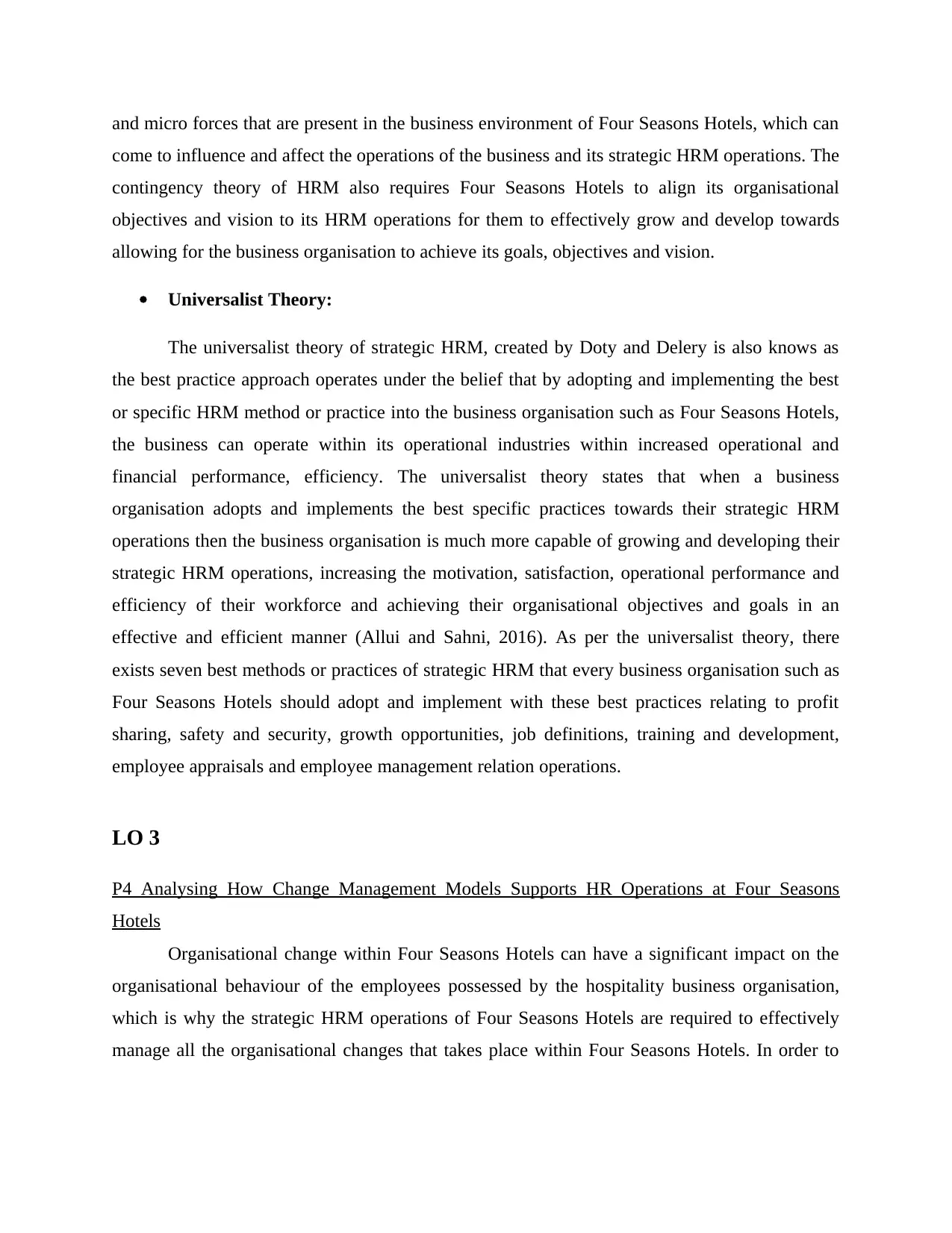
and micro forces that are present in the business environment of Four Seasons Hotels, which can
come to influence and affect the operations of the business and its strategic HRM operations. The
contingency theory of HRM also requires Four Seasons Hotels to align its organisational
objectives and vision to its HRM operations for them to effectively grow and develop towards
allowing for the business organisation to achieve its goals, objectives and vision.
Universalist Theory:
The universalist theory of strategic HRM, created by Doty and Delery is also knows as
the best practice approach operates under the belief that by adopting and implementing the best
or specific HRM method or practice into the business organisation such as Four Seasons Hotels,
the business can operate within its operational industries within increased operational and
financial performance, efficiency. The universalist theory states that when a business
organisation adopts and implements the best specific practices towards their strategic HRM
operations then the business organisation is much more capable of growing and developing their
strategic HRM operations, increasing the motivation, satisfaction, operational performance and
efficiency of their workforce and achieving their organisational objectives and goals in an
effective and efficient manner (Allui and Sahni, 2016). As per the universalist theory, there
exists seven best methods or practices of strategic HRM that every business organisation such as
Four Seasons Hotels should adopt and implement with these best practices relating to profit
sharing, safety and security, growth opportunities, job definitions, training and development,
employee appraisals and employee management relation operations.
LO 3
P4 Analysing How Change Management Models Supports HR Operations at Four Seasons
Hotels
Organisational change within Four Seasons Hotels can have a significant impact on the
organisational behaviour of the employees possessed by the hospitality business organisation,
which is why the strategic HRM operations of Four Seasons Hotels are required to effectively
manage all the organisational changes that takes place within Four Seasons Hotels. In order to
come to influence and affect the operations of the business and its strategic HRM operations. The
contingency theory of HRM also requires Four Seasons Hotels to align its organisational
objectives and vision to its HRM operations for them to effectively grow and develop towards
allowing for the business organisation to achieve its goals, objectives and vision.
Universalist Theory:
The universalist theory of strategic HRM, created by Doty and Delery is also knows as
the best practice approach operates under the belief that by adopting and implementing the best
or specific HRM method or practice into the business organisation such as Four Seasons Hotels,
the business can operate within its operational industries within increased operational and
financial performance, efficiency. The universalist theory states that when a business
organisation adopts and implements the best specific practices towards their strategic HRM
operations then the business organisation is much more capable of growing and developing their
strategic HRM operations, increasing the motivation, satisfaction, operational performance and
efficiency of their workforce and achieving their organisational objectives and goals in an
effective and efficient manner (Allui and Sahni, 2016). As per the universalist theory, there
exists seven best methods or practices of strategic HRM that every business organisation such as
Four Seasons Hotels should adopt and implement with these best practices relating to profit
sharing, safety and security, growth opportunities, job definitions, training and development,
employee appraisals and employee management relation operations.
LO 3
P4 Analysing How Change Management Models Supports HR Operations at Four Seasons
Hotels
Organisational change within Four Seasons Hotels can have a significant impact on the
organisational behaviour of the employees possessed by the hospitality business organisation,
which is why the strategic HRM operations of Four Seasons Hotels are required to effectively
manage all the organisational changes that takes place within Four Seasons Hotels. In order to
Paraphrase This Document
Need a fresh take? Get an instant paraphrase of this document with our AI Paraphraser
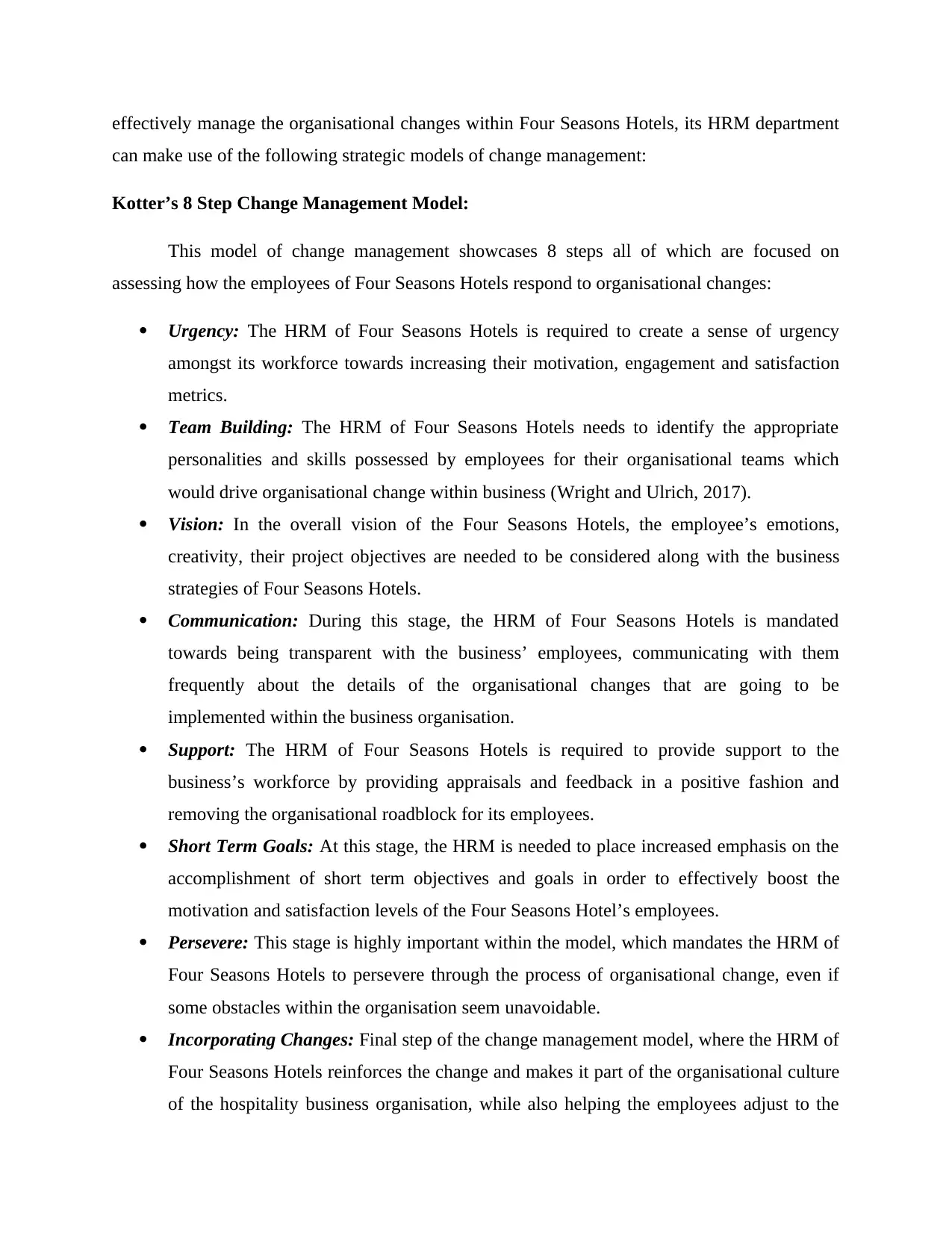
effectively manage the organisational changes within Four Seasons Hotels, its HRM department
can make use of the following strategic models of change management:
Kotter’s 8 Step Change Management Model:
This model of change management showcases 8 steps all of which are focused on
assessing how the employees of Four Seasons Hotels respond to organisational changes:
Urgency: The HRM of Four Seasons Hotels is required to create a sense of urgency
amongst its workforce towards increasing their motivation, engagement and satisfaction
metrics.
Team Building: The HRM of Four Seasons Hotels needs to identify the appropriate
personalities and skills possessed by employees for their organisational teams which
would drive organisational change within business (Wright and Ulrich, 2017).
Vision: In the overall vision of the Four Seasons Hotels, the employee’s emotions,
creativity, their project objectives are needed to be considered along with the business
strategies of Four Seasons Hotels.
Communication: During this stage, the HRM of Four Seasons Hotels is mandated
towards being transparent with the business’ employees, communicating with them
frequently about the details of the organisational changes that are going to be
implemented within the business organisation.
Support: The HRM of Four Seasons Hotels is required to provide support to the
business’s workforce by providing appraisals and feedback in a positive fashion and
removing the organisational roadblock for its employees.
Short Term Goals: At this stage, the HRM is needed to place increased emphasis on the
accomplishment of short term objectives and goals in order to effectively boost the
motivation and satisfaction levels of the Four Seasons Hotel’s employees.
Persevere: This stage is highly important within the model, which mandates the HRM of
Four Seasons Hotels to persevere through the process of organisational change, even if
some obstacles within the organisation seem unavoidable.
Incorporating Changes: Final step of the change management model, where the HRM of
Four Seasons Hotels reinforces the change and makes it part of the organisational culture
of the hospitality business organisation, while also helping the employees adjust to the
can make use of the following strategic models of change management:
Kotter’s 8 Step Change Management Model:
This model of change management showcases 8 steps all of which are focused on
assessing how the employees of Four Seasons Hotels respond to organisational changes:
Urgency: The HRM of Four Seasons Hotels is required to create a sense of urgency
amongst its workforce towards increasing their motivation, engagement and satisfaction
metrics.
Team Building: The HRM of Four Seasons Hotels needs to identify the appropriate
personalities and skills possessed by employees for their organisational teams which
would drive organisational change within business (Wright and Ulrich, 2017).
Vision: In the overall vision of the Four Seasons Hotels, the employee’s emotions,
creativity, their project objectives are needed to be considered along with the business
strategies of Four Seasons Hotels.
Communication: During this stage, the HRM of Four Seasons Hotels is mandated
towards being transparent with the business’ employees, communicating with them
frequently about the details of the organisational changes that are going to be
implemented within the business organisation.
Support: The HRM of Four Seasons Hotels is required to provide support to the
business’s workforce by providing appraisals and feedback in a positive fashion and
removing the organisational roadblock for its employees.
Short Term Goals: At this stage, the HRM is needed to place increased emphasis on the
accomplishment of short term objectives and goals in order to effectively boost the
motivation and satisfaction levels of the Four Seasons Hotel’s employees.
Persevere: This stage is highly important within the model, which mandates the HRM of
Four Seasons Hotels to persevere through the process of organisational change, even if
some obstacles within the organisation seem unavoidable.
Incorporating Changes: Final step of the change management model, where the HRM of
Four Seasons Hotels reinforces the change and makes it part of the organisational culture
of the hospitality business organisation, while also helping the employees adjust to the
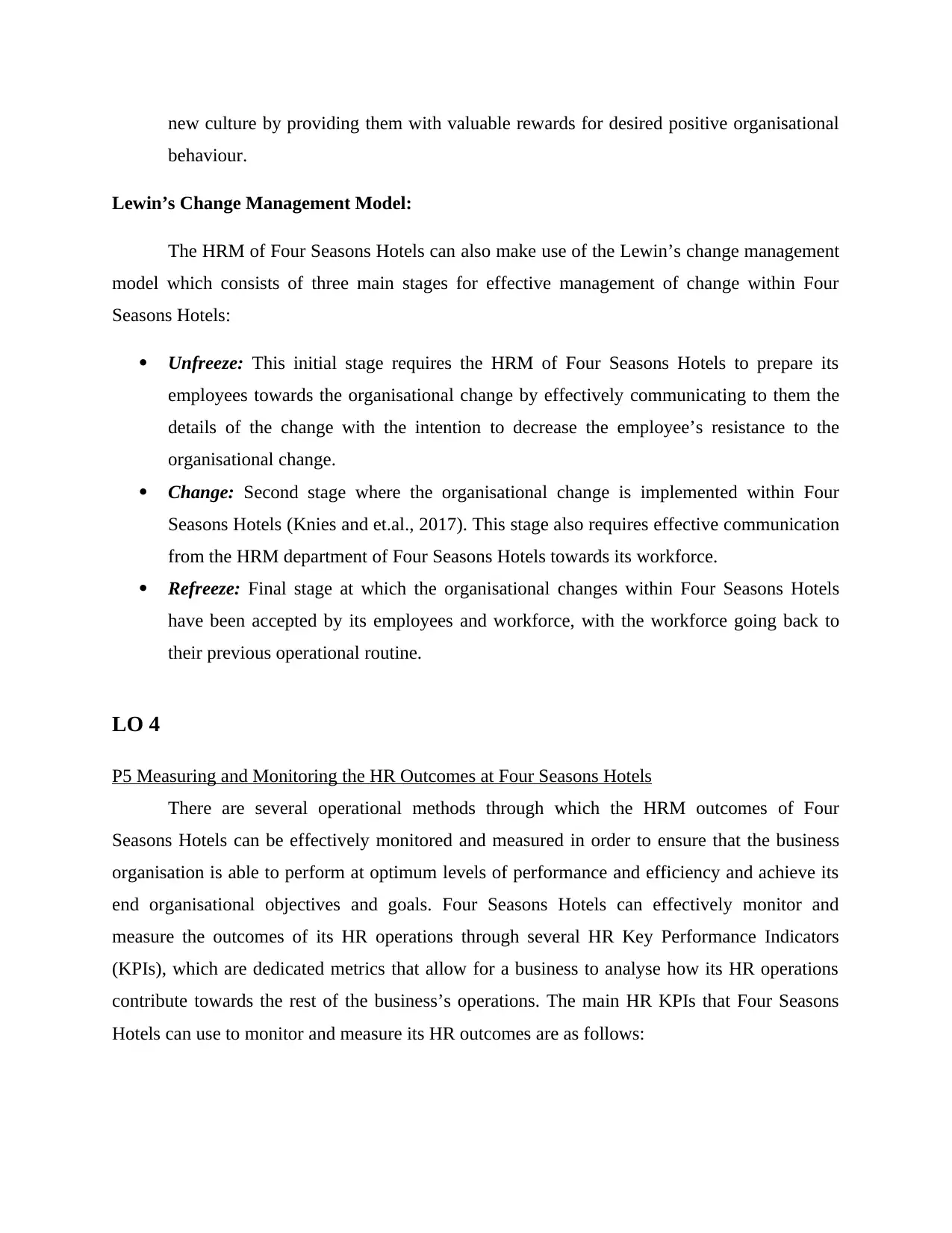
new culture by providing them with valuable rewards for desired positive organisational
behaviour.
Lewin’s Change Management Model:
The HRM of Four Seasons Hotels can also make use of the Lewin’s change management
model which consists of three main stages for effective management of change within Four
Seasons Hotels:
Unfreeze: This initial stage requires the HRM of Four Seasons Hotels to prepare its
employees towards the organisational change by effectively communicating to them the
details of the change with the intention to decrease the employee’s resistance to the
organisational change.
Change: Second stage where the organisational change is implemented within Four
Seasons Hotels (Knies and et.al., 2017). This stage also requires effective communication
from the HRM department of Four Seasons Hotels towards its workforce.
Refreeze: Final stage at which the organisational changes within Four Seasons Hotels
have been accepted by its employees and workforce, with the workforce going back to
their previous operational routine.
LO 4
P5 Measuring and Monitoring the HR Outcomes at Four Seasons Hotels
There are several operational methods through which the HRM outcomes of Four
Seasons Hotels can be effectively monitored and measured in order to ensure that the business
organisation is able to perform at optimum levels of performance and efficiency and achieve its
end organisational objectives and goals. Four Seasons Hotels can effectively monitor and
measure the outcomes of its HR operations through several HR Key Performance Indicators
(KPIs), which are dedicated metrics that allow for a business to analyse how its HR operations
contribute towards the rest of the business’s operations. The main HR KPIs that Four Seasons
Hotels can use to monitor and measure its HR outcomes are as follows:
behaviour.
Lewin’s Change Management Model:
The HRM of Four Seasons Hotels can also make use of the Lewin’s change management
model which consists of three main stages for effective management of change within Four
Seasons Hotels:
Unfreeze: This initial stage requires the HRM of Four Seasons Hotels to prepare its
employees towards the organisational change by effectively communicating to them the
details of the change with the intention to decrease the employee’s resistance to the
organisational change.
Change: Second stage where the organisational change is implemented within Four
Seasons Hotels (Knies and et.al., 2017). This stage also requires effective communication
from the HRM department of Four Seasons Hotels towards its workforce.
Refreeze: Final stage at which the organisational changes within Four Seasons Hotels
have been accepted by its employees and workforce, with the workforce going back to
their previous operational routine.
LO 4
P5 Measuring and Monitoring the HR Outcomes at Four Seasons Hotels
There are several operational methods through which the HRM outcomes of Four
Seasons Hotels can be effectively monitored and measured in order to ensure that the business
organisation is able to perform at optimum levels of performance and efficiency and achieve its
end organisational objectives and goals. Four Seasons Hotels can effectively monitor and
measure the outcomes of its HR operations through several HR Key Performance Indicators
(KPIs), which are dedicated metrics that allow for a business to analyse how its HR operations
contribute towards the rest of the business’s operations. The main HR KPIs that Four Seasons
Hotels can use to monitor and measure its HR outcomes are as follows:
⊘ This is a preview!⊘
Do you want full access?
Subscribe today to unlock all pages.

Trusted by 1+ million students worldwide
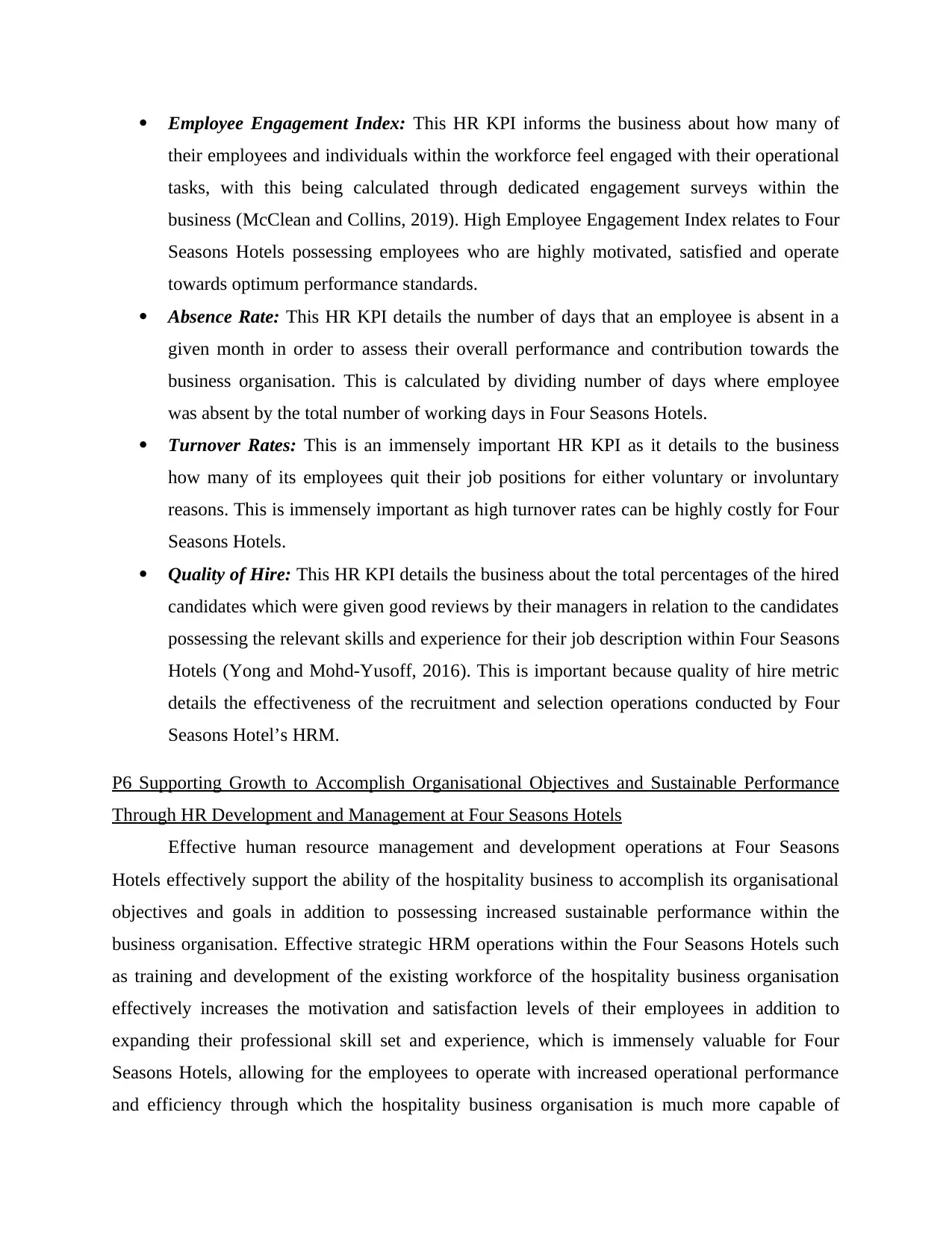
Employee Engagement Index: This HR KPI informs the business about how many of
their employees and individuals within the workforce feel engaged with their operational
tasks, with this being calculated through dedicated engagement surveys within the
business (McClean and Collins, 2019). High Employee Engagement Index relates to Four
Seasons Hotels possessing employees who are highly motivated, satisfied and operate
towards optimum performance standards.
Absence Rate: This HR KPI details the number of days that an employee is absent in a
given month in order to assess their overall performance and contribution towards the
business organisation. This is calculated by dividing number of days where employee
was absent by the total number of working days in Four Seasons Hotels.
Turnover Rates: This is an immensely important HR KPI as it details to the business
how many of its employees quit their job positions for either voluntary or involuntary
reasons. This is immensely important as high turnover rates can be highly costly for Four
Seasons Hotels.
Quality of Hire: This HR KPI details the business about the total percentages of the hired
candidates which were given good reviews by their managers in relation to the candidates
possessing the relevant skills and experience for their job description within Four Seasons
Hotels (Yong and Mohd-Yusoff, 2016). This is important because quality of hire metric
details the effectiveness of the recruitment and selection operations conducted by Four
Seasons Hotel’s HRM.
P6 Supporting Growth to Accomplish Organisational Objectives and Sustainable Performance
Through HR Development and Management at Four Seasons Hotels
Effective human resource management and development operations at Four Seasons
Hotels effectively support the ability of the hospitality business to accomplish its organisational
objectives and goals in addition to possessing increased sustainable performance within the
business organisation. Effective strategic HRM operations within the Four Seasons Hotels such
as training and development of the existing workforce of the hospitality business organisation
effectively increases the motivation and satisfaction levels of their employees in addition to
expanding their professional skill set and experience, which is immensely valuable for Four
Seasons Hotels, allowing for the employees to operate with increased operational performance
and efficiency through which the hospitality business organisation is much more capable of
their employees and individuals within the workforce feel engaged with their operational
tasks, with this being calculated through dedicated engagement surveys within the
business (McClean and Collins, 2019). High Employee Engagement Index relates to Four
Seasons Hotels possessing employees who are highly motivated, satisfied and operate
towards optimum performance standards.
Absence Rate: This HR KPI details the number of days that an employee is absent in a
given month in order to assess their overall performance and contribution towards the
business organisation. This is calculated by dividing number of days where employee
was absent by the total number of working days in Four Seasons Hotels.
Turnover Rates: This is an immensely important HR KPI as it details to the business
how many of its employees quit their job positions for either voluntary or involuntary
reasons. This is immensely important as high turnover rates can be highly costly for Four
Seasons Hotels.
Quality of Hire: This HR KPI details the business about the total percentages of the hired
candidates which were given good reviews by their managers in relation to the candidates
possessing the relevant skills and experience for their job description within Four Seasons
Hotels (Yong and Mohd-Yusoff, 2016). This is important because quality of hire metric
details the effectiveness of the recruitment and selection operations conducted by Four
Seasons Hotel’s HRM.
P6 Supporting Growth to Accomplish Organisational Objectives and Sustainable Performance
Through HR Development and Management at Four Seasons Hotels
Effective human resource management and development operations at Four Seasons
Hotels effectively support the ability of the hospitality business to accomplish its organisational
objectives and goals in addition to possessing increased sustainable performance within the
business organisation. Effective strategic HRM operations within the Four Seasons Hotels such
as training and development of the existing workforce of the hospitality business organisation
effectively increases the motivation and satisfaction levels of their employees in addition to
expanding their professional skill set and experience, which is immensely valuable for Four
Seasons Hotels, allowing for the employees to operate with increased operational performance
and efficiency through which the hospitality business organisation is much more capable of
Paraphrase This Document
Need a fresh take? Get an instant paraphrase of this document with our AI Paraphraser
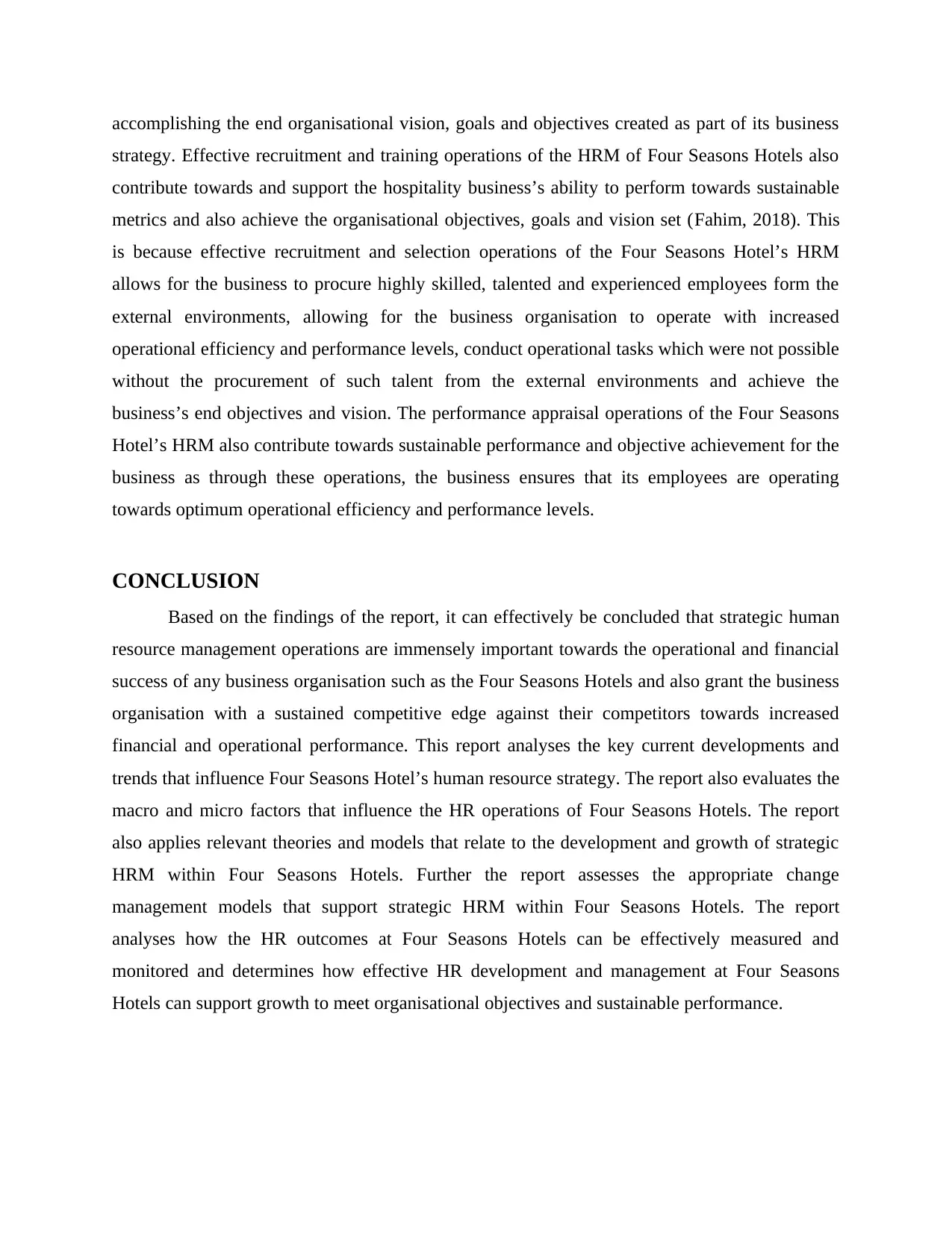
accomplishing the end organisational vision, goals and objectives created as part of its business
strategy. Effective recruitment and training operations of the HRM of Four Seasons Hotels also
contribute towards and support the hospitality business’s ability to perform towards sustainable
metrics and also achieve the organisational objectives, goals and vision set (Fahim, 2018). This
is because effective recruitment and selection operations of the Four Seasons Hotel’s HRM
allows for the business to procure highly skilled, talented and experienced employees form the
external environments, allowing for the business organisation to operate with increased
operational efficiency and performance levels, conduct operational tasks which were not possible
without the procurement of such talent from the external environments and achieve the
business’s end objectives and vision. The performance appraisal operations of the Four Seasons
Hotel’s HRM also contribute towards sustainable performance and objective achievement for the
business as through these operations, the business ensures that its employees are operating
towards optimum operational efficiency and performance levels.
CONCLUSION
Based on the findings of the report, it can effectively be concluded that strategic human
resource management operations are immensely important towards the operational and financial
success of any business organisation such as the Four Seasons Hotels and also grant the business
organisation with a sustained competitive edge against their competitors towards increased
financial and operational performance. This report analyses the key current developments and
trends that influence Four Seasons Hotel’s human resource strategy. The report also evaluates the
macro and micro factors that influence the HR operations of Four Seasons Hotels. The report
also applies relevant theories and models that relate to the development and growth of strategic
HRM within Four Seasons Hotels. Further the report assesses the appropriate change
management models that support strategic HRM within Four Seasons Hotels. The report
analyses how the HR outcomes at Four Seasons Hotels can be effectively measured and
monitored and determines how effective HR development and management at Four Seasons
Hotels can support growth to meet organisational objectives and sustainable performance.
strategy. Effective recruitment and training operations of the HRM of Four Seasons Hotels also
contribute towards and support the hospitality business’s ability to perform towards sustainable
metrics and also achieve the organisational objectives, goals and vision set (Fahim, 2018). This
is because effective recruitment and selection operations of the Four Seasons Hotel’s HRM
allows for the business to procure highly skilled, talented and experienced employees form the
external environments, allowing for the business organisation to operate with increased
operational efficiency and performance levels, conduct operational tasks which were not possible
without the procurement of such talent from the external environments and achieve the
business’s end objectives and vision. The performance appraisal operations of the Four Seasons
Hotel’s HRM also contribute towards sustainable performance and objective achievement for the
business as through these operations, the business ensures that its employees are operating
towards optimum operational efficiency and performance levels.
CONCLUSION
Based on the findings of the report, it can effectively be concluded that strategic human
resource management operations are immensely important towards the operational and financial
success of any business organisation such as the Four Seasons Hotels and also grant the business
organisation with a sustained competitive edge against their competitors towards increased
financial and operational performance. This report analyses the key current developments and
trends that influence Four Seasons Hotel’s human resource strategy. The report also evaluates the
macro and micro factors that influence the HR operations of Four Seasons Hotels. The report
also applies relevant theories and models that relate to the development and growth of strategic
HRM within Four Seasons Hotels. Further the report assesses the appropriate change
management models that support strategic HRM within Four Seasons Hotels. The report
analyses how the HR outcomes at Four Seasons Hotels can be effectively measured and
monitored and determines how effective HR development and management at Four Seasons
Hotels can support growth to meet organisational objectives and sustainable performance.
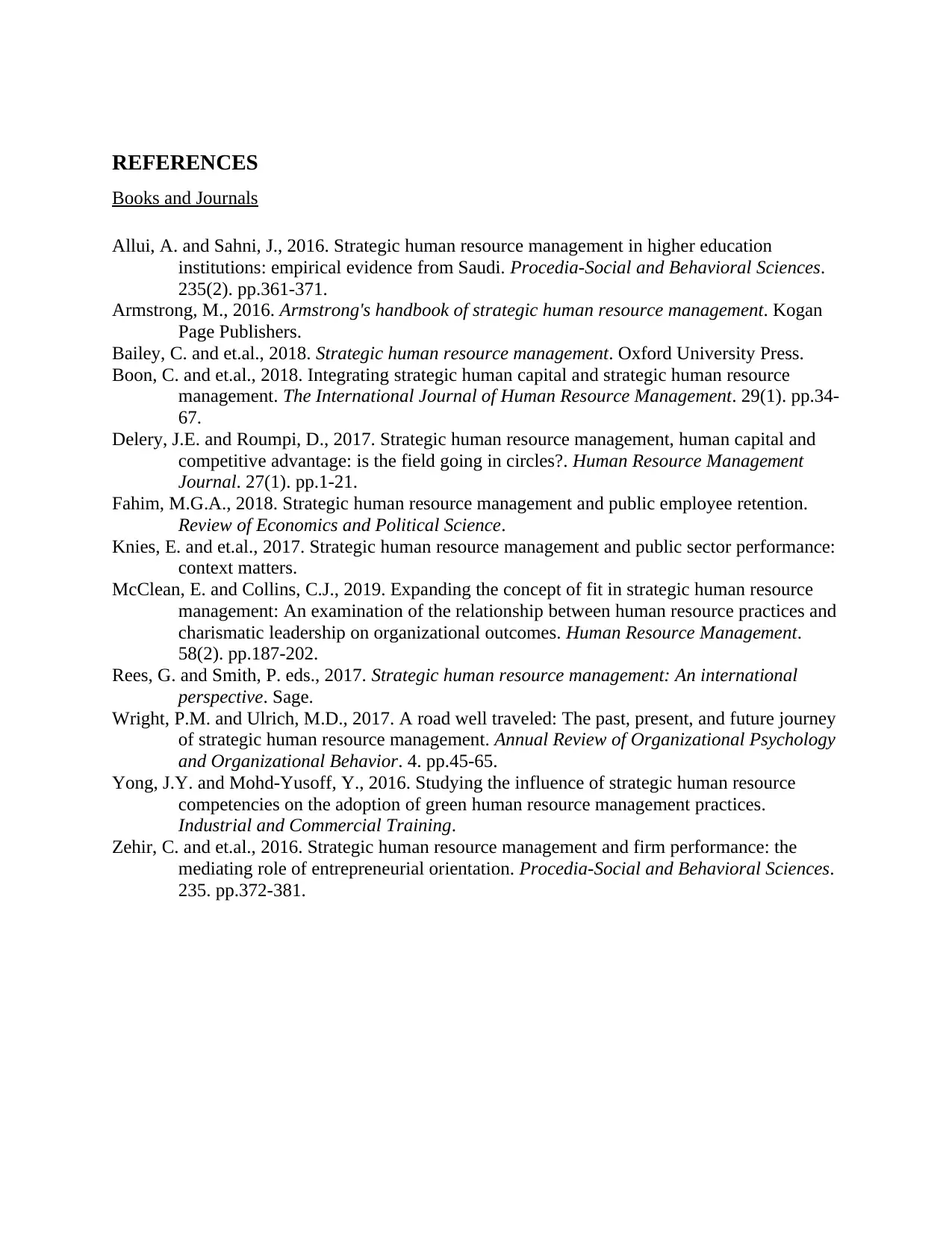
REFERENCES
Books and Journals
Allui, A. and Sahni, J., 2016. Strategic human resource management in higher education
institutions: empirical evidence from Saudi. Procedia-Social and Behavioral Sciences.
235(2). pp.361-371.
Armstrong, M., 2016. Armstrong's handbook of strategic human resource management. Kogan
Page Publishers.
Bailey, C. and et.al., 2018. Strategic human resource management. Oxford University Press.
Boon, C. and et.al., 2018. Integrating strategic human capital and strategic human resource
management. The International Journal of Human Resource Management. 29(1). pp.34-
67.
Delery, J.E. and Roumpi, D., 2017. Strategic human resource management, human capital and
competitive advantage: is the field going in circles?. Human Resource Management
Journal. 27(1). pp.1-21.
Fahim, M.G.A., 2018. Strategic human resource management and public employee retention.
Review of Economics and Political Science.
Knies, E. and et.al., 2017. Strategic human resource management and public sector performance:
context matters.
McClean, E. and Collins, C.J., 2019. Expanding the concept of fit in strategic human resource
management: An examination of the relationship between human resource practices and
charismatic leadership on organizational outcomes. Human Resource Management.
58(2). pp.187-202.
Rees, G. and Smith, P. eds., 2017. Strategic human resource management: An international
perspective. Sage.
Wright, P.M. and Ulrich, M.D., 2017. A road well traveled: The past, present, and future journey
of strategic human resource management. Annual Review of Organizational Psychology
and Organizational Behavior. 4. pp.45-65.
Yong, J.Y. and Mohd-Yusoff, Y., 2016. Studying the influence of strategic human resource
competencies on the adoption of green human resource management practices.
Industrial and Commercial Training.
Zehir, C. and et.al., 2016. Strategic human resource management and firm performance: the
mediating role of entrepreneurial orientation. Procedia-Social and Behavioral Sciences.
235. pp.372-381.
Books and Journals
Allui, A. and Sahni, J., 2016. Strategic human resource management in higher education
institutions: empirical evidence from Saudi. Procedia-Social and Behavioral Sciences.
235(2). pp.361-371.
Armstrong, M., 2016. Armstrong's handbook of strategic human resource management. Kogan
Page Publishers.
Bailey, C. and et.al., 2018. Strategic human resource management. Oxford University Press.
Boon, C. and et.al., 2018. Integrating strategic human capital and strategic human resource
management. The International Journal of Human Resource Management. 29(1). pp.34-
67.
Delery, J.E. and Roumpi, D., 2017. Strategic human resource management, human capital and
competitive advantage: is the field going in circles?. Human Resource Management
Journal. 27(1). pp.1-21.
Fahim, M.G.A., 2018. Strategic human resource management and public employee retention.
Review of Economics and Political Science.
Knies, E. and et.al., 2017. Strategic human resource management and public sector performance:
context matters.
McClean, E. and Collins, C.J., 2019. Expanding the concept of fit in strategic human resource
management: An examination of the relationship between human resource practices and
charismatic leadership on organizational outcomes. Human Resource Management.
58(2). pp.187-202.
Rees, G. and Smith, P. eds., 2017. Strategic human resource management: An international
perspective. Sage.
Wright, P.M. and Ulrich, M.D., 2017. A road well traveled: The past, present, and future journey
of strategic human resource management. Annual Review of Organizational Psychology
and Organizational Behavior. 4. pp.45-65.
Yong, J.Y. and Mohd-Yusoff, Y., 2016. Studying the influence of strategic human resource
competencies on the adoption of green human resource management practices.
Industrial and Commercial Training.
Zehir, C. and et.al., 2016. Strategic human resource management and firm performance: the
mediating role of entrepreneurial orientation. Procedia-Social and Behavioral Sciences.
235. pp.372-381.
⊘ This is a preview!⊘
Do you want full access?
Subscribe today to unlock all pages.

Trusted by 1+ million students worldwide
1 out of 12
Related Documents
Your All-in-One AI-Powered Toolkit for Academic Success.
+13062052269
info@desklib.com
Available 24*7 on WhatsApp / Email
![[object Object]](/_next/static/media/star-bottom.7253800d.svg)
Unlock your academic potential
Copyright © 2020–2026 A2Z Services. All Rights Reserved. Developed and managed by ZUCOL.





